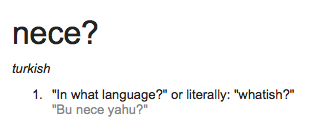



A “Content Translation Framework” using Postgresql’s jsonb field. It
simply sets and gets translations from a jsonb field called
translations.
You might ask why you should use django-nece since there are other, and more mature content translation frameworks like django-hvad and django-modeltranslation. Both of them are good in some ways, worst in others.
For instance, it is very hard for django-hvad users to get default
language if there is no corresponding translation for an object. And it
holds translated values in a different table, so every translation query
results in another hit to the database.
On the other hand django-modeldtranslation adds multiple additional
fields for multiple languages. The number of fields inceases by the
number of languages you need to support. At the end it becomes a huge
chunk of an object if you need to add more than 20 languages.
nece? more or less works like the latter one with an important
difference. It uses Postgresql’s new JSONB field to hold translation
information. And overrides the original one on query.
pip install django-nece
python setup.py install
Lets say we have a model called Fruit:
from nece.models import TranslationModel
class Fruit(TranslationModel):
name = models.CharField(max_length=255)
translatable_fields = ['name']
def __str__(self):
return self.name
TranslationModel adds a jsonb field to this table and sets
translations in a notation like the one below:
{u'de_de': {u'name': u'Apfel'},
u'tr_tr': {u'name': u'elma'}}
When we need the German translation we can simply choose the language and get the attribute as usual:
>> f = Fruit.objects.get(name='apple')
>> print(f.name)
apple
>> f.language('de_de')
>> print(f.name)
Apfel
You can also filter out the ones containing any language translation:
>> Fruit.objects.all()
[<Fruit: apple>, <Fruit: pear>, <Fruit: banana>]
>> Fruit.objects.language('tr_tr')
[<Fruit: elma>, <Fruit: armut>] # there is no translation for banana
>> Fruit.objects.language_or_default('tr_tr')
[<Fruit: elma>, <Fruit: armut>, <Fruit: banana>]
>> Fruit.objects.language('tr_tr').filter(name='elma')
[<Fruit: elma>]
>> Fruit.objects.language('tr_tr').get(name='elma')
<Fruit: elma>
>> fruit._language_code
tr_tr
>> fruit.name
elma
>> fruit.translate(name='armut').save()
>> fruit.name
armut
>> fruit.language('en')
